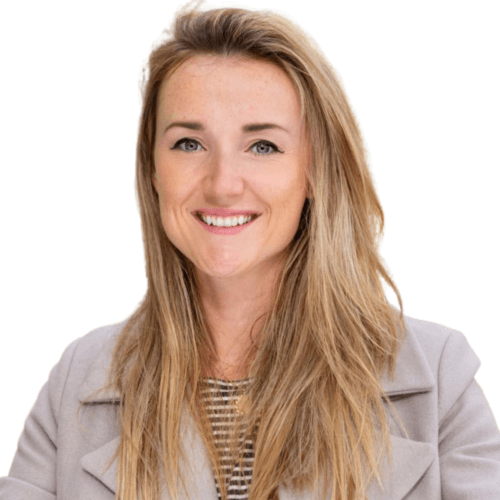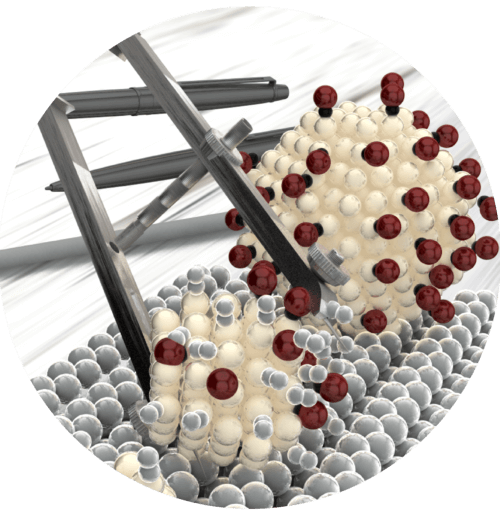

Charlotte Vogt

CV
Our research focuses on figuring out the details of how catalysts and (catalytic) reactions work. It’s always surprising to me that catalysis – which influences a third of the global gross domestic product – is generally employed empirically, often without any significant degree of fundamental understanding. A big reason for that is that the reactions are incredibly complex, with a cohort of important events all happening at the same time. Finding ways to study them, under realistic conditions, in spite (or rather, making use of) of their complexity is the aim of my group. To figure out how they work, so that we can eventually make those processes better in a bottom-up fashion, or to help invent the new ones that are necessary to bridge the energy, climate, and materials crises that our global society are facing.
An example of a reaction that we study is the conversion of carbon dioxide to valuable chemicals and fuels over catalysts. To study these types of reactions we develop special spectroscopic methodologies (a combination of specific experimental designs, state-of-the-art spectroscopy, and multivariate analyses) which will allow us to study details of the catalysts that we couldn’t study before.

Charlotte Vogt was born in 1991 in Utrecht, the Netherlands. She spent most of her primary education in Houston, Texas. After graduating from secondary school (ORS Lek en Linge in Culemborg, the Netherlands), she started an Undergraduate degree in Chemistry with a minor in Management and Policy at Utrecht University in 2009. Her Bachelor’s thesis was written under supervision of prof.dr.ir. Bert Weckhuysen, who also became her Master thesis supervisor, and ultimately the supervisor to her PhD thesis. Charlotte obtained her Masters in Science (Inorganic Chemistry and Catalysis) and Business Management at Utrecht University with “Greatest Distinction” in 2015. During her studies she took part in several committees, management teams, and councils, e.g. chairing a senior-year activity committee, the Rabobank Council, and the Educational Committee of the Graduate School of Life Sciences. During her studies she kept several jobs, and volunteered, amongst others, with schoolchildren in Ulaanbaatar, Mongolia. In 2015 she spent 7 months in Baton Rouge, Louisiana (USA), working as an intern in Investor Relations at Albemarle.
She commenced her doctoral degree in 2015, in a PhD project that was part of a TA-CHIPP initiative between BASF NL, NWO, Eindhoven University of Technology and Utrecht University. In December 2018 she obtained a VATAT fellowship for “outstanding international students” to perform part of her PhD research in Israel, at the Weizmann Institute for Science with dr. Baran Eren and prof.dr. Ronny Neumann. Here she was named Outstanding Female Scientist of 2019, awarded by the Israel Vacuum Society (IVS) and Intel Israel for “outstanding early career achievements”. In 2020 she received a Niels Stensen Fellowship based on “academic excellence and social commitment” to pursue postdoctoral research autonomously in Israel, at the Hebrew University of Jerusalem and the Weizmann Institute of Science. In April 2020 she obtained her doctorate degree with “Greatest Distinctions”.
In 2021 she started her own research group at the Technion Institute for Technology (the Vogt Laboratory of Catalysis for Fuels of the Future) which focuses on a deep fundamental understanding of catalytic processes (heterogeneous catalysis, homogeneous catalysis, electrocatalysis) that will quite literally fuel the future, such as – but not limited to – carbon dioxide valorization, nitrogen fixation and utilization, hydrogen production, and waste recycling. In the same year, she was listed as one of Forbes’ “30 under 30”, and won the Clara Immerwahr award for her achievements in catalysis research.
| Phone | Name | ||
| artiomnes96@campus.technion.ac.il |
Artiom Nesterenko |
||
| licht@campus.technion.ac.il | Asaf Licht | ||
| dsinausia@campus.technion.ac.il | Daniel Sinausia | ||
| deeprajverma@campus.technion.ac.il | Deepraj Verma | ||
| elias.haddad@campus.technion.ac.il | Elias Haddad | ||
| noamkaro@campus.technion.ac.il | Noam Karo | ||
| znoam@campus.technion.ac.il | Noam Zyser | ||
| ormayraz@campus.technion.ac.il | Or Mayraz | ||
| Pankaj Prajapati | |||
| Rutvija Dange | |||
| Tal Rosner | |||
|
zhaohuaichen@campus.technion.ac.il |
Zhaohuai Chen |
||
| Yara Hijaze |
- The concept of the active site in heterogeneous catalysis
Charlotte Vogt and Bert M. Weckhuysen
Nature Chemistry Reviews, 2022, 6, 89-111. - Dynamic restructuring of supported metal nanoparticles and its implications for structure insensitive catalysis
Charlotte Vogt, Florian Meirer, Matteo Monai, Esther Groeneveld, Davide Ferri, Rutger A. van Santen, Maarten Nachtegaal, Raymond R. Unocic, Anatoly I. Frenkel, and Bert M. Weckhuysen
Nature Communications, 2021, 12, 7096. - The renaissance of the Sabatier reaction and its applications on Earth and in space
Charlotte Vogt, Matteo Monai, Gert Jan Kramer and Bert M. Weckhuysen
Nature Catalysis, 2019, 2, 188-197.
– “Highly cited paper” - Understanding carbon dioxide activation and carbon-carbon coupling over nickel
Charlotte Vogt, Matteo Monai, Ellen B. Sterk, Jonas Palle, Bart Zijlstra, Esther Groeneveld, Peter H. Berben, Jelle Boereboom, Emiel J. M. Hensen, Florian Meirer, Ivo A. W. Filot, Bert M. Weckhuysen
Nature Communications, 2019, 10, 5330.
– Selected as “1 of the 50 top papers in the field of Chemistry and Materials Science published in 2019” - Unravelling structure sensitivity in CO2 hydrogenation over nickel
Charlotte Vogt, Esther Groeneveld, Gerda Kamsma, Maarten Nachtegaal, Li Lu, Christopher J. Kiely, Peter H. Berben, Florian Meirer, Bert M. Weckhuysen
Nature Catalysis, 2018, 1, 127-134.
– “Highly cited paper”
